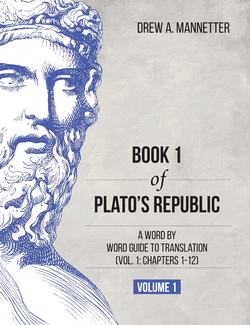Читать книгу Book 1 of Plato's Republic - Drew A. Mannetter - Страница 8
На сайте Литреса книга снята с продажи.
ОглавлениеNOTES ON THE TEXT
The reader should be familiar with the following conventions and terms. Capital letters in the Greek text indicate a change of interlocutor.
Punctuation (S. 188):
Greek , (comma) = English , (comma).
Greek . (period) = English . (period).
Greek · (point above the line) = English : and ; (colon and semicolon).
Greek ; (semicolon) = English ? (question mark).
Accents (S. 138-87):
Acute: ´
Circumflex: ῀
Grave: `
Syllables (S. 138-148):
The last syllable is called the ultima: σοφός.
The next to the last syllable is called the penult: νόμος.
The one before the penult is called the antepenult: ἄνθροπος.
Words are named according to their accent as follows (S. 157):
Oxytone (acute on the ultima): θήρ, καλός, λϵλυκώς.
Paroxytone (acute on the penult): λύω, λϵίπω, λϵλυκότος.
Proparoxytone (acute on the antepenult): ἄνθροπος, παδϵύομϵν.
Perispomenon (circumflex on the ultima): γῆ, θϵοῦ.
Properispomenon (circumflex on the penult): πρᾶξις, μοῦσα.
Abbreviations in the citations:
S.:
Smyth, Herbert Weir, Greek Grammar. Revised by Gordon M. Messing. Harvard University Press. 1984.
D.:
Denniston, J.D., The Greek Particle. Second Edition revised by K.J. Dover. Hackett Publishing Company, Inc.. Indianapolis/Cambridge. 1991.
L. and S.:
Liddell and Scott, An Intermediate Greek Dictionary. Oxford at the Clarendon Press, Oxford University Press, 1986.
Liddell and Scott, A Greek-English Lexicon. Oxford at the Clarendon Press, Oxford University Press, 1968.
Other sources:
The Greek text was taken from The Republic of Plato. Edited with Critical Notes, Commentary and Appendices. James Adam, M.A.. Vol. 1. Cambridge at the University Press, 1902. This can be accessed at the web site: Tarik Wareh public-domain classics books – Union College (WWW1.union.edu/wareh/books).
The translation of Pindar was taken from the following text: Pindar. The Odes of Pindar. Translated by Sir John Sandys. Loeb Classical Library56. Cambridge: Harvard UP, 1989.
The term “substantive”:
The terms “substantive” and “used substantively” are employed freely throughout the explanations. The term “substantive” simply means “as a noun.” Greek has great flexibility in the way it creates nouns as adjectives, participles, infinitives, adverbs, and entire clauses can be used as nouns by the addition of the article. Do not be confused by the term if you are not familiar with it.
